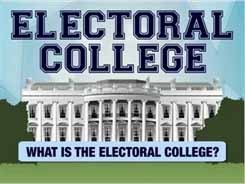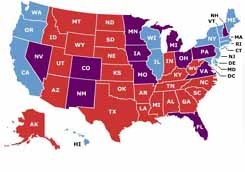
The Electoral College, administered by the National Archives and Records Administration (NARA), is not a place, it is a process that began as part of the original design of the U.S. Constitution. The Electoral College was established by the founding fathers as a compromise between election of the president by Congress and election by popular vote. The people of the United States vote for the electors who then vote for the President.
How did the terms "Elector" and "Electoral College" come into usage?
The term "electoral college" does not appear in the Constitution. Article II of the Constitution and the 12th Amendment refer to "electors," but not to the "electoral college." In the Federalist Papers (No. 68), Alexander Hamilton refers to the process of selecting the Executive, and refers to "the people of each State (who) shall choose a number of persons as electors," but he does not use the term "electoral college."
The founders appropriated the concept of electors from the Holy Roman Empire (962 - 1806). An elector was one of a number of princes of the various German states within the Holy Roman Empire who had a right to participate in the election of the German king (who generally was crowned as emperor). The term "college" (from the Latin collegium), refers to a body of persons that act as a unit, as in the college of cardinals who advise the Pope and vote in papal elections. In the early 1800's, the term "electoral college" came into general usage as the unofficial designation for the group of citizens selected to cast votes for President and Vice President. It was first written into Federal law in 1845, and today the term appears in 3 U.S.C. section 4, in the section heading and in the text as "college of electors."
Who selects the Electors?
The process for selecting electors varies throughout the United States. Generally, the political parties nominate electors at their State party conventions or by a vote of the party's central committee in each State. Electors are often selected to recognize their service and dedication to their political party. They may be State elected officials, party leaders, or persons who have a personal or political affiliation with the Presidential candidate. Then the voters in each State choose the electors on the day of the general election. The electors' names may or may not appear on the ballot below the name of the candidates running for President, depending on the procedure in each State.
What are the qualifications to be an elector?

The U.S. Constitution contains very few provisions relating to the qualifications of electors. Article II, section 1, clause 2 provides that no Senator or Representative, or Person holding an Office of Trust or Profit under the United States, shall be appointed an Elector. As a historical matter, the 14th Amendment provides that State officials who have engaged in insurrection or rebellion against the United States or given aid and comfort to its enemies are disqualified from serving as electors. This prohibition relates to the post-Civil War era.
A State's certification of electors on its Certificates of Ascertainment is generally sufficient to establish the qualifications of electors.
 Print
Print Email
Email







